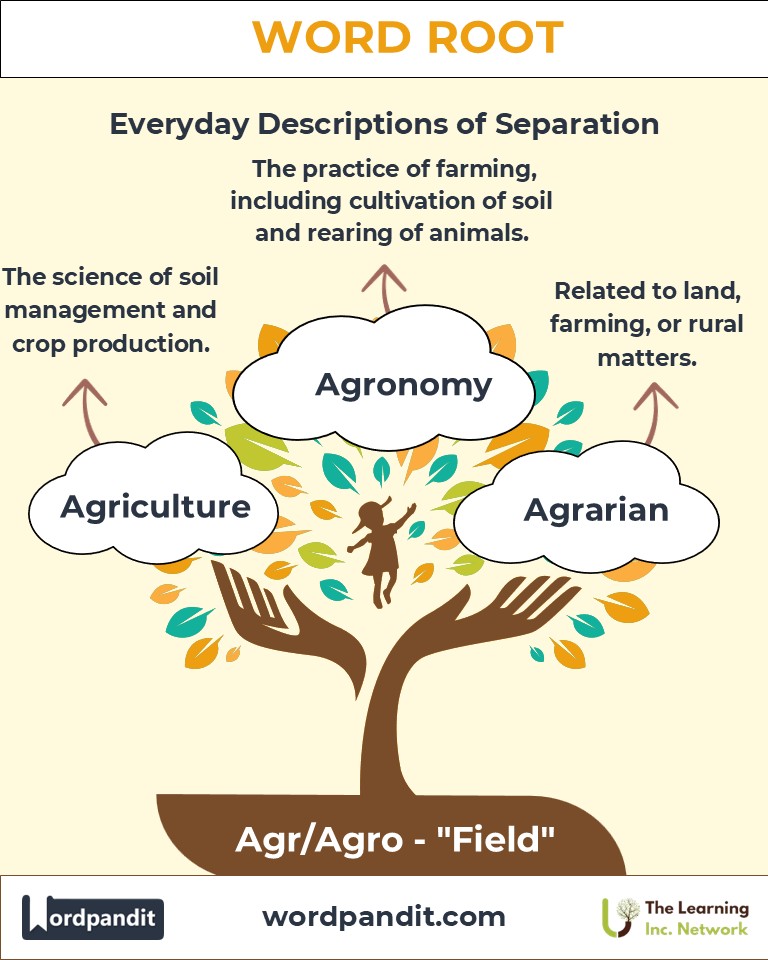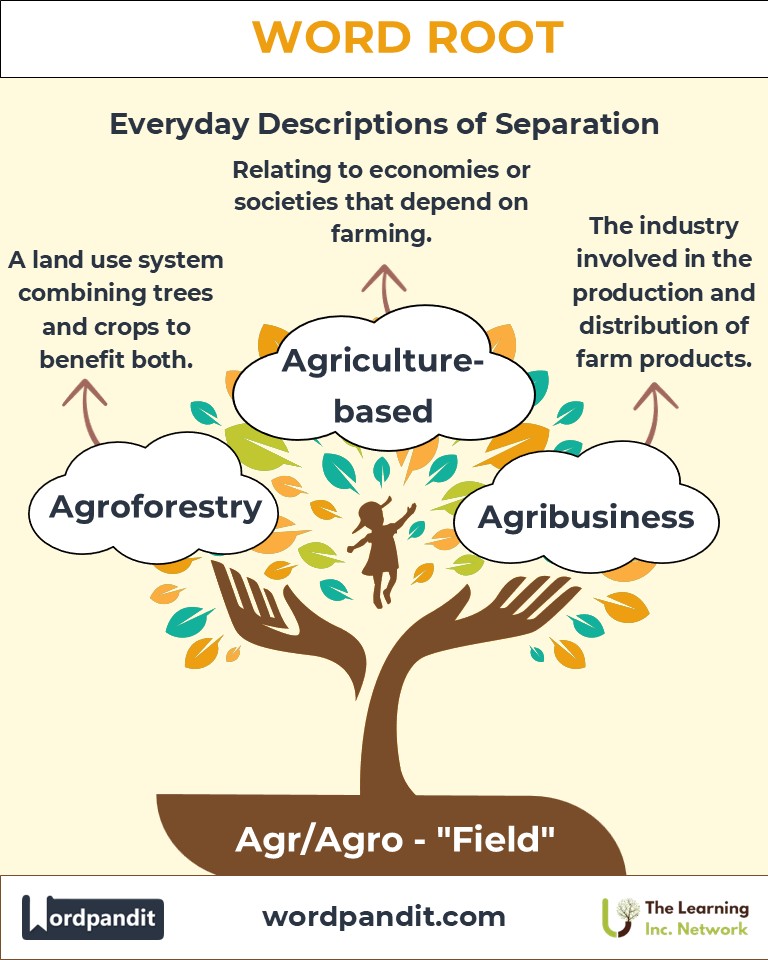Agr/Agro: Cultivating Connections Between Fields and Words
Discover the roots of "Agr/Agro," derived from Latin and Greek origins meaning "field" or "soil." This root has sown the seeds of countless words, from agriculture to agroforestry, enriching our understanding of cultivation, sustainability, and innovation.

Table of Contents
- Introduction: The Heart of Agr/Agro
- Etymology and Historical Journey
- Mnemonic: Remembering Agr/Agro
- Common Agr/Agro-Related Terms
- Agr/Agro Through Time
- Agr/Agro in Specialized Fields
- Illustrative Story: Agr/Agro in Action
- Cultural Significance of Agr/Agro
- The Agr/Agro Family Tree
- FAQs about the Agr/Agro Root
- Test Your Knowledge: Agr/Agro Quiz
- Conclusion: The Enduring Legacy of Agr/Agro
Introduction: The Heart of Agr/Agro
The root "Agr/Agro," pronounced ag-ruh or ah-gro, holds a pivotal place in language and life. Stemming from the Latin ager (field) and Greek agros (soil or land), this root embodies the essence of cultivation, growth, and sustenance. Words like "agriculture" and "agronomy" remind us of humanity’s timeless bond with the earth and the continuous innovation in cultivating its bounty.

Etymology and Historical Journey
The journey of "Agr/Agro" begins in antiquity, where agriculture formed the bedrock of civilizations. The Latin ager evolved to describe fields and land, while the Greek agros often denoted rural landscapes. These roots interwove with languages like Old French (agriculture) and English, expanding their scope to encapsulate practices, sciences, and philosophies tied to farming and land management.
Mnemonic: Remembering Agr/Agro
To remember Agr/Agro, imagine a lush green field with a farmer cultivating crops under a bright sun.
Mnemonic Device: "Agr/Agro grows fields of words, sowing knowledge for fertile minds."
Common Agr/Agro-Related Terms
- Agriculture (ag-ri-kul-cher): The practice of cultivating soil and raising crops or livestock.
Example: "Agriculture is vital for food security and economic stability." - Agroforestry (ag-ro-for-uh-stree): The integration of trees and shrubs into agricultural systems.
Example: "Agroforestry practices can improve soil health and biodiversity." - Agronomist (ag-ro-nuh-mist): A specialist in soil management and crop production.
Example: "The agronomist developed strategies to increase wheat yields." - Agri-business (ag-ri-biz-ness): Commercial agriculture enterprises.
Example: "The agri-business expanded to export organic produce." - Agrobiology (ag-ro-bahy-ol-uh-jee): The study of plant nutrition and soil conditions.
Example: "Agrobiology research supports sustainable farming."
Agr/Agro Through Time
- Ancient Agriculture: Early terms focused on survival, with farming marking a leap from nomadic to settled lifestyles.
- Industrial Revolution: The rise of agri-business reflected the era’s emphasis on mechanization and productivity.
- Modern Era: Terms like agroecology and agroforestry highlight sustainability and environmental awareness.
Agr/Agro in Specialized Fields
- Ecology: Agroecology integrates farming with ecological principles to sustain resources.
Application: Combating climate change and soil degradation. - Economics: Agri-business emphasizes large-scale operations and supply chains.
Significance: It drives global trade and food accessibility. - Science: Agrobiology delves into nutrient cycles and genetic modification.
Relevance: Advances in crop resilience and yield.
Illustrative Story: Agr/Agro in Action
Emma, a young agronomist, worked on introducing agroforestry in a drought-stricken village. By planting nitrogen-fixing trees alongside crops, she revitalized the soil and boosted yields. Emma’s innovative application of agroecology inspired neighboring communities, proving how ancient practices could blend with modern science to transform lives.
Cultural Significance of Agr/Agro
Agricultural terms deeply influence cultural identities. Harvest festivals like Thanksgiving or Pongal celebrate agricultural abundance. Historically, agrarian societies valued the field's role in community and sustenance, making Agr/Agro an enduring symbol of human ingenuity and resilience.

The Agr/Agro Family Tree
- Geo- (Earth): Geography, Geobotany
- Hort- (Garden): Horticulture, Hortatory
- Cult- (Cultivate): Cultivation, Culture

FAQs About the Agr/Agro Word Root
Q: What does "Agr/Agro" mean?
A: Agr/Agro means "field" or "soil" and is tied to farming, cultivation, and rural life. Its origins are rooted in the Latin ager (field) and Greek agros (soil). Words derived from this root often reflect agricultural practices or the study of land and its resources.
Q: What is agroforestry, and why is it important?
A: Agroforestry is a sustainable practice that combines agriculture with forestry by planting trees or shrubs alongside crops. This approach improves soil fertility, enhances biodiversity, reduces erosion, and provides additional income from timber or fruits. It’s a key strategy for combating climate change and ensuring food security.
Q: How does agri-business differ from traditional farming?
A: Agri-business refers to the large-scale, commercial aspect of agriculture, encompassing the production, processing, and distribution of agricultural products. Unlike traditional farming, which may focus on small-scale subsistence, agri-business relies on mechanization, advanced technology, and global supply chains to operate efficiently and profitably.
Q: What is agronomy, and how does it impact farming?
A: Agronomy is the science of soil management and crop production. Agronomists study how to improve yields, enhance soil health, and develop sustainable farming practices. Their work plays a critical role in addressing challenges like climate change, food shortages, and land degradation.
Q: What is the difference between agriculture and horticulture?
A: Agriculture is the broad practice of cultivating crops and raising livestock, often on a large scale. Horticulture, a subset of agriculture, focuses specifically on cultivating plants like fruits, vegetables, flowers, and ornamental plants. It is often associated with smaller-scale, intensive gardening or farming.
Q: What role does agroecology play in modern agriculture?
A: Agroecology applies ecological principles to agricultural systems, focusing on sustainability and environmental health. It encourages practices like crop rotation, intercropping, and minimal pesticide use to promote biodiversity and resource conservation while maintaining productivity.
Q: Why is agrobiology significant?
A: Agrobiology studies the relationship between plants, soil, and microorganisms to optimize plant growth and soil health. This field is essential for advancing sustainable farming practices, improving crop yields, and reducing dependency on chemical fertilizers.
Test Your Knowledge: Agr/Agro Word Root Quiz
1. What does "Agr/Agro" mean?
2. Which term involves integrating trees into farming?
3. What does an agronomist study?
4. Which of the following is a commercial farming enterprise?
5. What is the study of plant-soil interactions called?
Conclusion: The Enduring Legacy of Agr/Agro
The root Agr/Agro weaves a linguistic thread through the fabric of civilization, highlighting humanity’s enduring connection to the land. As we embrace sustainable practices and innovative technologies, Agr/Agro reminds us of the timeless art and science of cultivation, bridging ancient wisdom with future possibilities.














